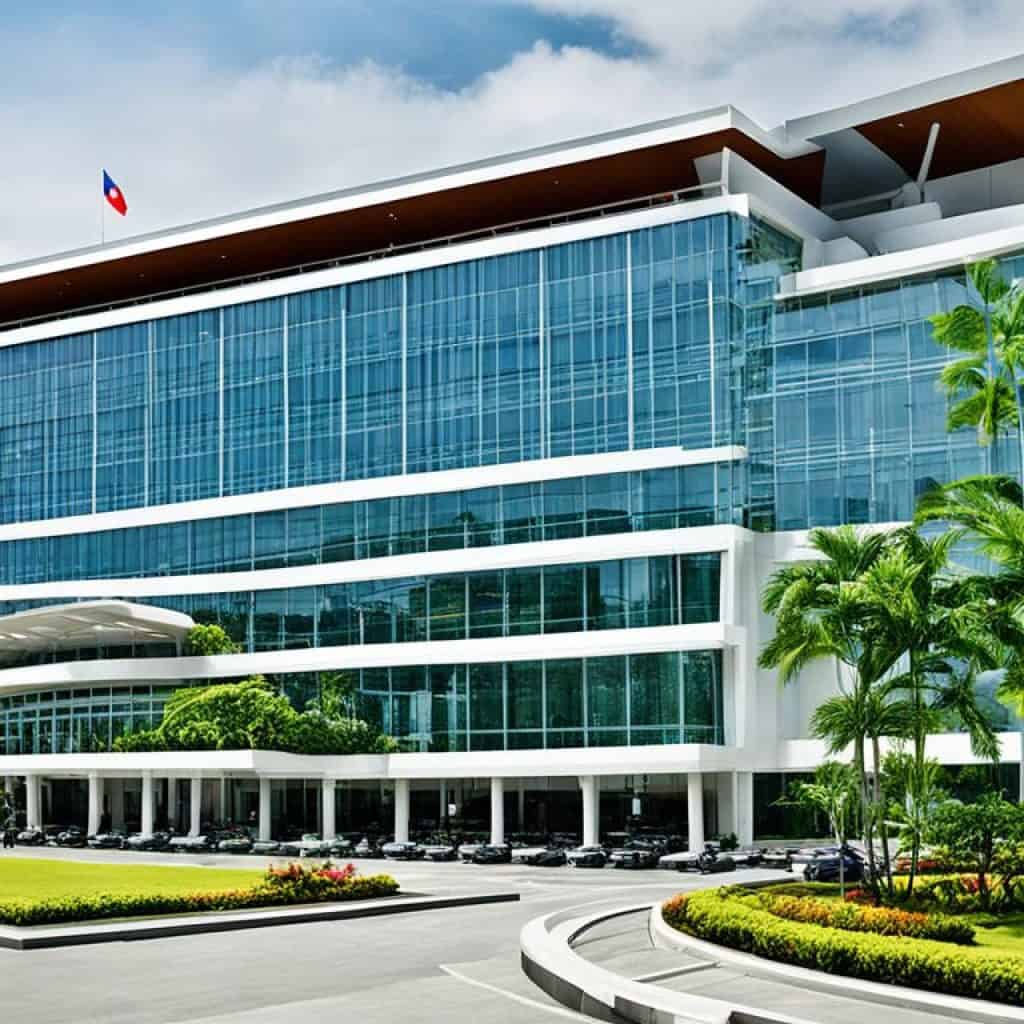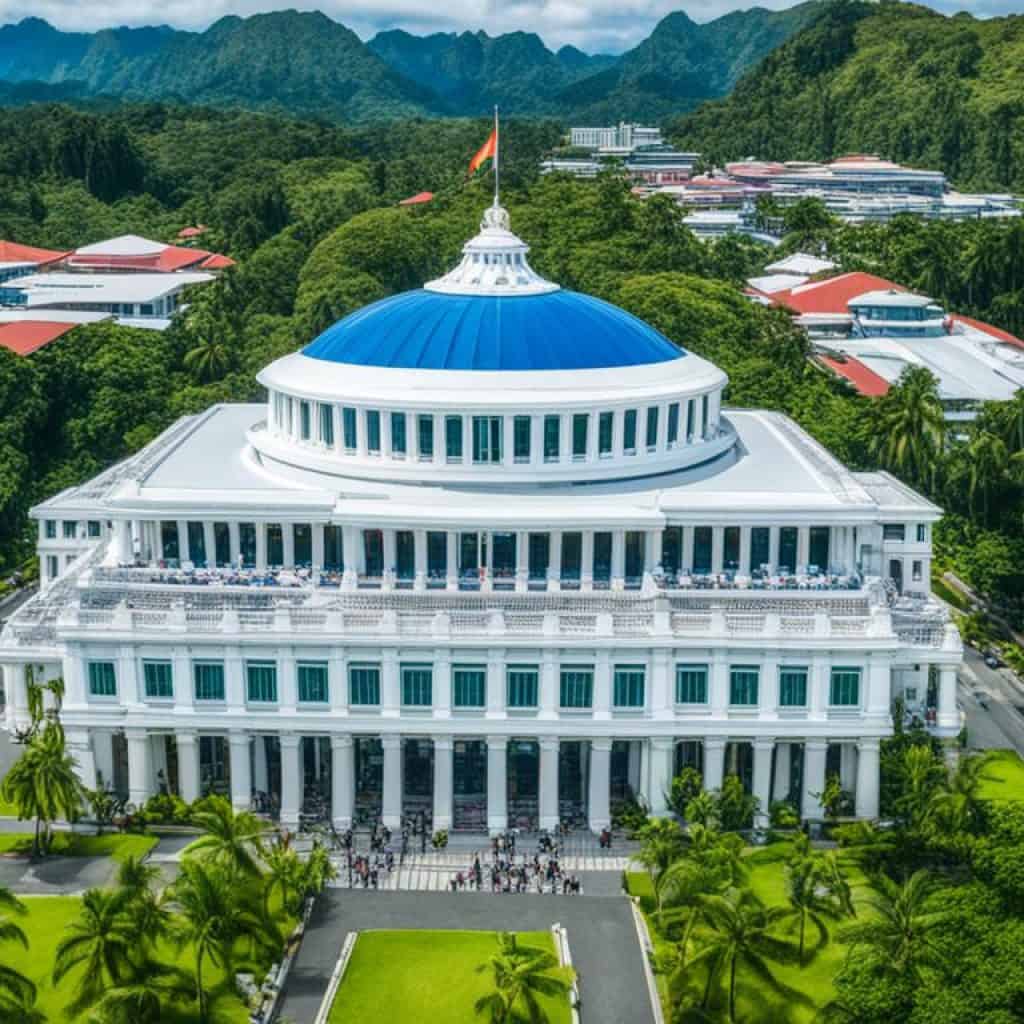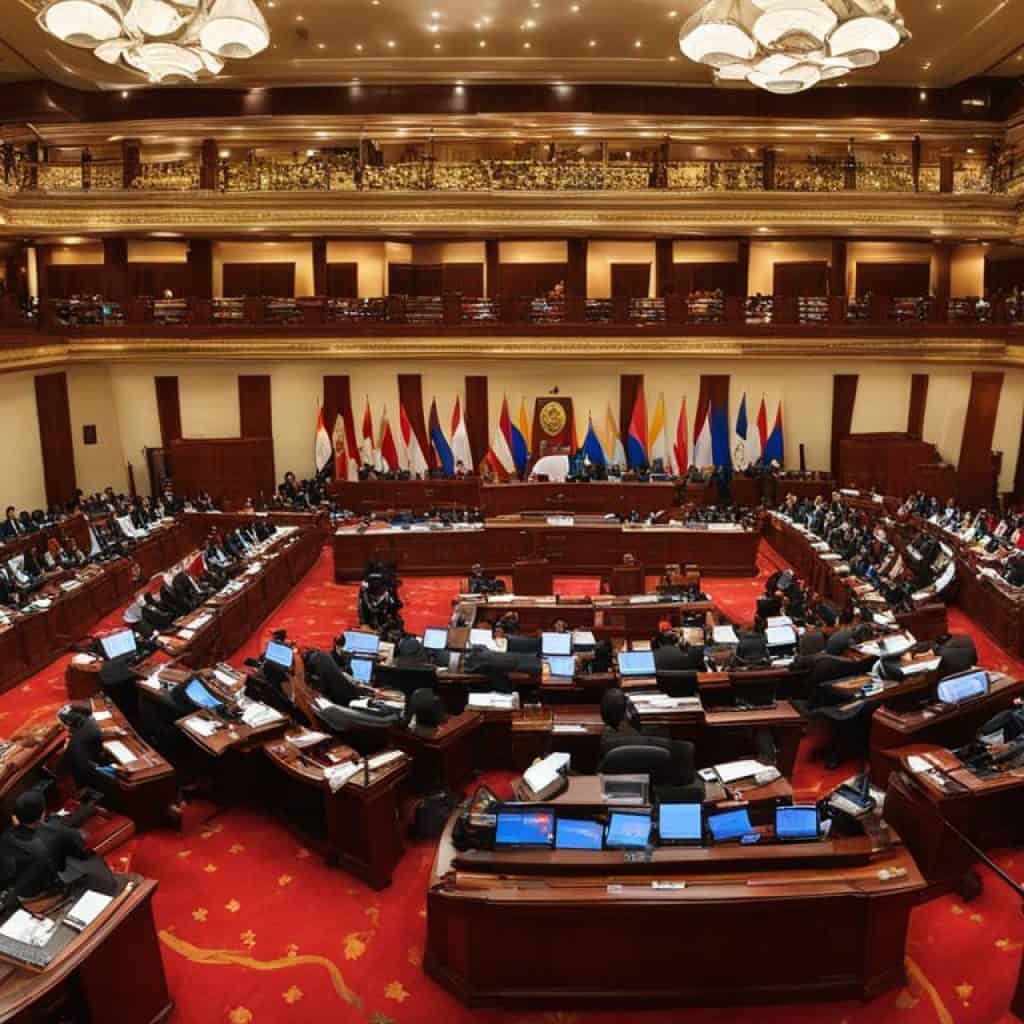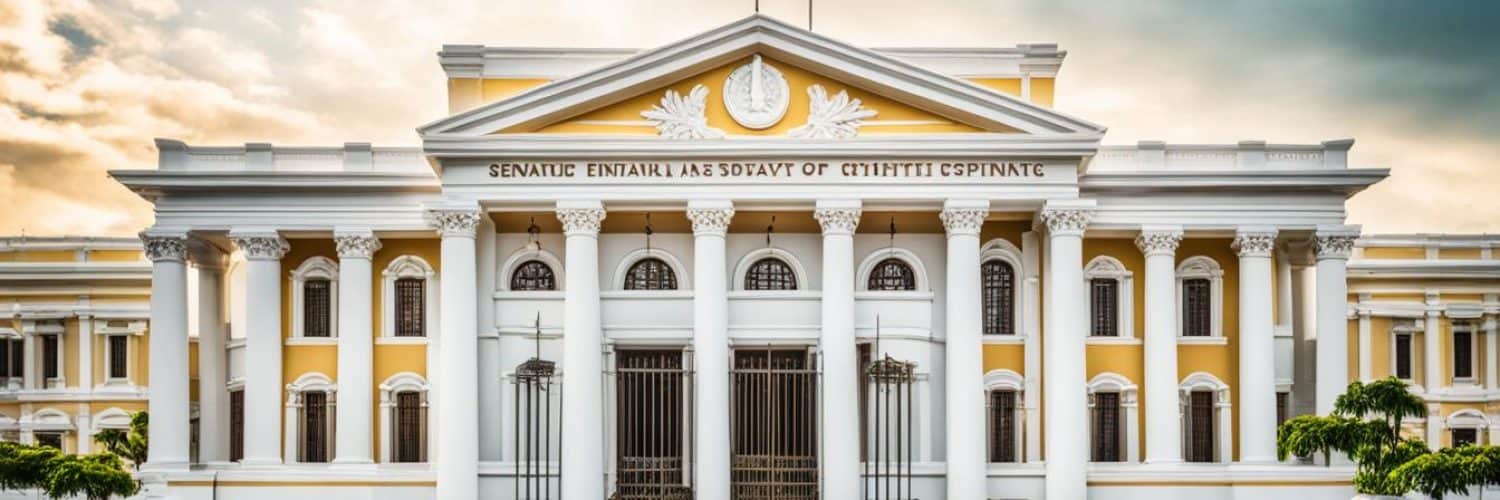Are you curious about the location of the Senate of the Philippines or how to get in touch with them? Look no further! In this comprehensive guide, we will provide you with all the essential details you need to know about the Senate’s address, contact information, office hours, and more. Whether you’re planning a visit or need to reach out for inquiries, this article has got you covered.
Key Takeaways:
- The Senate of the Philippines is located at GSIS Building, Financial Center, Roxas Boulevard, Pasay City, Metro Manila.
- You can contact the Senate at +63 2 552 6601 to 6692 or through their official website.
- The office hours of the Senate are from Monday to Friday, from 8:00 AM to 5:00 PM.
Senate of the Philippines Location
The Senate of the Philippines is located in Pasay City, Metro Manila. It can be found in the GSIS Building at the Financial Center, along Roxas Boulevard. The strategic location ensures easy accessibility for visitors from various parts of the city and beyond.
Getting to the Senate of the Philippines is a breeze, as it is well-connected by different modes of transportation. Whether you prefer to drive, take public transportation, or use a ride-hailing service, there are multiple options available to reach your destination.
If you’re unfamiliar with the area, utilizing a map or a navigation app will guide you directly to the Senate’s location. It’s always a good idea to plan your journey in advance and check for any possible road closures or traffic updates to ensure a smooth and hassle-free commute.
With its prominent position in Pasay City, the Senate of the Philippines serves as a beacon of democracy and the center for legislative processes.
How To Get To Senate Of The Philippines:
- By car: Drive along Roxas Boulevard and locate the GSIS Building at the Financial Center. Parking facilities are available for visitors.
- By public transportation: Take a bus or jeepney that traverses Roxas Boulevard. Look for the GSIS Building or ask the driver to drop you off at the Senate of the Philippines.
- By ride-hailing service: Use a ride-hailing app and input the Senate of the Philippines as your destination. The app will provide you with the most efficient route and estimated time of arrival.
- By taxi: Hail a taxi and inform the driver that you are heading to the Senate of the Philippines. Taxis are readily available throughout the city.
- By Metro rail: Take the LRT Line 1 and disembark at Gil Puyat Station. From there, you can either walk or take a short taxi ride to the Senate of the Philippines.
Senate of the Philippines Contact Information
If you need to get in touch with the Senate of the Philippines, you can reach them through the following contact details:
| Contact Number | +63 2 552 6601 to 6692 |
|---|---|
| Official Website | www.senate.gov.ph |
The Senate of the Philippines office hours are from Monday to Friday, 8:00 AM to 5:00 PM. Whether you have inquiries, concerns, or require any further information, don’t hesitate to contact them or visit their website.
Visiting the Senate of the Philippines
If you are planning to visit the Senate of the Philippines, it is important to be aware of the office hours and plan your visit accordingly. The Senate is open to visitors from Monday to Friday, between 8:00 AM and 5:00 PM. Take note of these hours to ensure that you don’t miss the opportunity to explore this important institution.
To make the most out of your visit, it is recommended to check the official website of the Senate for any updates or changes in the schedule. This will help you stay informed about any special events, closures, or adjustments to the office hours. By checking the website in advance, you can plan your visit accordingly and maximize your experience at the Senate.
When it comes to directions, you can easily find the location of the Senate of the Philippines using a map or a navigation app. The Senate is situated in Pasay City, Metro Manila, specifically at the GSIS Building in the Financial Center, along Roxas Boulevard. Whether you prefer to use public transportation or drive in your own vehicle, there are various routes available to reach the Senate.
“Visiting the Senate of the Philippines offers a unique opportunity to witness the legislative process in action and experience the rich history and culture of the nation.”
Remember to plan your visit in advance, familiarize yourself with the directions, and check for any updates on the official website. This will ensure a smooth and enjoyable visit to the Senate of the Philippines.
| Senate Office Hours | Location |
|---|---|
| Monday to Friday, 8:00 AM – 5:00 PM | GSIS Building, Financial Center, Roxas Boulevard, Pasay City, Metro Manila |
Senate of the Philippines Facilities
The Senate of the Philippines provides a range of facilities and amenities to ensure a comfortable and productive experience for its visitors. Here are some of the key features:
- Comfortable Seating Areas: The Senate offers well-designed seating areas where visitors can relax and wait.
- Meeting Rooms: The Senate has spacious and well-equipped meeting rooms that can accommodate various group sizes.
- Audiovisual Equipment: Visitors can make use of state-of-the-art audiovisual equipment for presentations and discussions.
- Cafeteria: The Senate has a cafeteria where visitors can enjoy a variety of delicious food and beverages.
In addition to these facilities, the Senate of the Philippines also prioritizes accessibility. It provides accessible facilities for individuals with disabilities, ensuring that every visitor feels welcome and included.
Whether you are visiting for official business or as a guest, the Senate of the Philippines strives to provide a well-maintained and organized environment that caters to your needs.

Visitor Testimonial
“The Senate of the Philippines facilities are top-notch. The meeting rooms are spacious and equipped with the latest technology. The seating areas are comfortable, and the cafeteria offers a wide range of food options. As someone who frequently visits the Senate, I can say that the facilities contribute to a productive and enjoyable experience.” – Jane Doe, Business Consultant
Senate of the Philippines Services
The Senate of the Philippines is dedicated to providing a wide range of services to the public, ensuring a seamless experience for visitors. Whether you have inquiries, need information dissemination, or require support for legislative matters, the Senate is here to assist you every step of the way.
Our knowledgeable and trained staff are committed to delivering efficient and helpful services, addressing your concerns with utmost professionalism and attention. You can approach the designated help desks conveniently located within the Senate premises for immediate assistance.
If you prefer to contact us remotely, feel free to reach out to us through our designated assistance channels. Our friendly staff are ready to provide the necessary guidance and support via phone, email, or other communication methods.
At the Senate of the Philippines, we prioritize your needs and strive to ensure that you receive the highest level of service. We are here to assist you with any inquiries or issues you may have, making your visit or interaction with the Senate as smooth and pleasant as possible.
Highlights of Senate of the Philippines Services
| Services | Benefits |
|---|---|
| Assistance with inquiries | Get prompt and accurate answers to your questions or concerns |
| Information dissemination | Stay informed about the latest legislative updates, announcements, and news |
| Support for legislative matters | Receive guidance and assistance regarding legislative processes, bills, and other related matters |
| Professional staff | Benefit from the expertise and professionalism of our dedicated team |
Choose the channel that suits you best or visit our help desks during your visit to the Senate of the Philippines. Our committed staff are always ready to provide the necessary assistance and ensure that your experience with us is positive and productive.
Senate of the Philippines Visitor Guidelines
When visiting the Senate of the Philippines, it is important to familiarize yourself with the visitor guidelines and rules in order to ensure a smooth and respectful experience. By following these guidelines, you can contribute to maintaining the security and integrity of the institution.
Here are some key guidelines to keep in mind:
- Security protocols: Follow all security protocols and procedures upon entering the Senate premises. Be prepared to go through security screenings and present valid identification when requested.
- Code of conduct: Respect the code of conduct during your visit. Maintain appropriate behavior, refrain from disruptive actions, and show courtesy towards fellow visitors and staff.
- Cameras and recording devices: Note that there may be restrictions on the use of cameras and recording devices within the Senate. It is recommended to inquire about any specific guidelines regarding photography or video recording beforehand.
- Appropriate attire: Dress respectfully and appropriately when visiting the Senate. Avoid wearing revealing or offensive clothing that may be deemed inappropriate within the institution.
By observing these guidelines, you can contribute to creating a positive and secure environment for everyone visiting the Senate of the Philippines.
Senate of the Philippines Public Tours
Are you curious about the inner workings of the Senate of the Philippines? Join our public tours and get an exclusive glimpse into the rich history, structure, and operations of this esteemed institution. Led by knowledgeable guides, our guided tours are designed to provide you with a deeper understanding of the legislative process and the vital role played by the Senate in the Philippine government.
During the tour, you’ll explore the hallowed halls of the Senate, where important decisions are made and legislation is crafted. Marvel at the grandeur of our heritage-filled chambers and witness firsthand the democratic process that shapes the nation.
Learn about the Senate’s esteemed senators, past and present, who have dedicated their lives to public service and the betterment of the Filipino people. Discover the milestones and challenges that have shaped the Senate’s history, and gain insights into the institution’s commitment to transparency, accountability, and public engagement.
Our guided tours are not only educational but also interactive. You’ll have the opportunity to engage with our knowledgeable guides, ask questions, and participate in engaging discussions. Whether you’re a student, a history enthusiast, or simply curious about the legislative process, our tours offer a unique opportunity to learn and be inspired.

Experience the heart of Philippine democracy through a visit to the Senate of the Philippines. Join our public tours and witness firsthand how laws are made, debates are held, and decisions are shaped. Book your tour now and embark on an enlightening journey through the corridors of power.
Senate of the Philippines Outreach Programs
The Senate of the Philippines is committed to actively engaging in various outreach programs and community initiatives. These programs are designed to promote public participation, enhance education, and raise awareness about the legislative process and the significance of democracy. Through these initiatives, the Senate aims to foster a strong and meaningful connection between the institution and the Filipino people.
One of the key objectives of the Senate’s outreach programs is to encourage active citizenry and engagement in the democratic process. The Senate believes that an informed and involved citizenry is essential for a thriving democracy. These programs provide opportunities for individuals and communities to participate in public discussions, consultations, and forums, enabling them to voice their concerns, opinions, and ideas.
The outreach programs organized by the Senate also focus on educational initiatives aimed at enhancing civic awareness and understanding. The Senate recognizes the importance of educating the public, particularly the youth, about the legislative process and the role of the Senate in shaping the nation. Through workshops, seminars, and educational campaigns, the Senate promotes the values of democracy, good governance, and civic responsibility.
In addition to promoting public participation and education, the Senate’s outreach programs also aim to raise awareness about specific issues and advocacies. The Senate collaborates with various stakeholders, nonprofit organizations, and government agencies to address key concerns and challenges faced by communities across the country. By initiating and supporting community-driven projects, the Senate actively works towards improving the lives and well-being of the Filipino people.
The Senate of the Philippines firmly believes that community engagement plays a vital role in shaping legislative decisions and policies. Through its outreach programs, the Senate seeks to bridge the gap between the institution and the Filipino people, ensuring that the voices of the citizens are heard and their needs are addressed.
Senate of the Philippines Official Events
The Senate of the Philippines plays a vital role in hosting a wide range of official events, including conferences, meetings, and special sessions. These events bring together key stakeholders, lawmakers, and government officials to discuss and make important decisions that significantly impact the nation.
Conferences hosted by the Senate provide a platform for the exchange of ideas, knowledge sharing, and collaboration on various issues of national importance. These conferences bring together experts, industry leaders, and policymakers to explore solutions and strategies that address pressing challenges.
Meetings held at the Senate provide opportunities for lawmakers to deliberate on legislation, review policy proposals, and make informed decisions for the betterment of the Filipino people. These meetings serve as a platform for dialogue and collaboration among senators, ensuring a thorough discussion of matters that shape the nation’s future.
Special sessions convened by the Senate are called to address urgent concerns or unforeseen circumstances that require immediate attention from lawmakers. These sessions allow for swift decision-making and the formulation of necessary actions to address critical situations.
The Senate of the Philippines is equipped with state-of-the-art facilities, providing a conducive environment for these official events. From robust audiovisual equipment to spacious meeting rooms, the Senate ensures that all necessary resources are available to facilitate productive and impactful discussions.
Quote
“Official events organized by the Senate of the Philippines serve as forums for critical discussions and decision-making, enabling stakeholders to come together and shape the future of our nation.” – [Insert Name]
With its commitment to inclusivity, transparency, and active participation, the Senate strives to create an environment where fruitful discussions take place, fostering collaboration and advancing the collective welfare of the Filipino people.
| Types of Official Events | Key Features |
|---|---|
| Conferences | Knowledge sharing, collaboration, solutions-focused discussions |
| Meetings | Legislative deliberations, policy reviews, decision-making |
| Special Sessions | Urgent concerns, rapid decision-making, necessary actions |
Whether it’s facilitating comprehensive conferences, enabling impactful meetings, or responding swiftly through special sessions, the Senate of the Philippines remains committed to its mandate as a crucial bastion of governance and democratic decision-making.
By fostering dialogue, collaboration, and the exchange of ideas, the Senate continues to shape the future of the nation and empower the Filipino people.
Senate of the Philippines Media Center
The Senate of the Philippines understands the importance of transparent and timely communication with the media and the public. To facilitate this, the Senate has established a dedicated Media Center to provide information and updates about the institution.
In the Media Center, journalists and media professionals can access press releases, statements, and other official communications from the Senate. These resources ensure that accurate and up-to-date information is readily available to the media and the public, fostering greater transparency and understanding of the Senate’s activities.
The Media Center is also the primary point of contact for media accreditation. For certain events or access to restricted areas within the Senate premises, media personnel may be required to obtain accreditation through the designated process.
“The Senate of the Philippines believes in the vital role of the media in promoting accountability and informing the public. The Media Center is designed to facilitate efficient and transparent communication, ensuring that accurate and timely information reaches the media and the Filipino people.”
Senate of the Philippines Legislative Process
The Senate of the Philippines plays a vital role in the legislative process of the country. It is responsible for the creation, review, and enactment of laws that have a significant impact on the nation and its people. Through a systematic process, the Senate ensures that proposed legislation receives thorough consideration and scrutiny.
Senators in the Senate propose bills, which serve as the starting point for new laws. These bills undergo several stages of review and deliberation to ensure their feasibility, constitutionality, and relevance. The Senate committees, comprised of experienced lawmakers, conduct hearings to gather insights and perspectives from experts, stakeholders, and the public.
During these committee hearings, in-depth discussions and debates take place to explore the strengths, weaknesses, and potential impacts of the proposed laws. This process promotes transparency and accountability, allowing senators to gather evidence, exchange views, and revise the bills as necessary.
Once the committee hearings are completed, the proposed legislation moves on to the plenary sessions. In these sessions, all senators have the opportunity to discuss, debate, and voice their opinions on the bills. Through these debates, different perspectives are presented, and modifications can be made to further refine the proposed laws.
Voting is a crucial part of the legislative process in the Senate. Senators cast their votes to determine the fate of the bills. The majority vote determines whether a bill will progress or be rejected. The voting outcomes significantly influence the shaping of laws that align with the needs and aspirations of the Filipino people.
The legislative process in the Senate fosters thorough consideration and scrutiny of laws, ensuring that they are enacted with the best interests of the nation in mind. The Senate’s commitment to transparency, accountability, and democratic principles contributes to the development of legislation that positively impacts the lives of the Filipino people.
Key Stages of the Senate Legislative Process:
| Stage | Description |
|---|---|
| Proposal | Senators propose bills to address various issues or concerns. |
| Committee Review | Bills undergo thorough review and scrutiny in Senate committees. |
| Hearings and Debates | Committee hearings and debates gather insights and perspectives from experts, stakeholders, and the public. |
| Plenary Sessions | All senators discuss, debate, and voice their opinions on the bills. |
| Voting | Senators cast their votes to determine the fate of the bills. |
| Enactment | Approved bills are signed into law following the necessary processes. |
Senate of the Philippines Legislative Calendar
The Senate of the Philippines follows a comprehensive legislative calendar that provides an organized schedule of sessions, committee hearings, and other significant dates related to legislative activities. This calendar serves as a valuable tool for senators, stakeholders, and the general public, ensuring that everyone remains well-informed about the progress of bills and the overall legislative agenda.
The Senate’s legislative calendar is regularly updated to reflect any changes or additions to the schedule, enabling individuals to plan and participate effectively in the legislative process. By consulting the calendar, senators can prioritize their involvement in sessions and committees, ensuring that they remain engaged in key discussions and decision-making processes.
The legislative calendar also serves as a valuable resource for stakeholders and the public, enabling them to stay informed about important dates and events within the Senate. This accessibility promotes transparency and encourages active engagement from all sectors of society, allowing for the collective shaping of legislative outcomes and policy decisions.
Furthermore, the legislative calendar highlights committee hearings, which play a crucial role in the legislative process. These hearings provide a platform for in-depth discussions, expert testimonies, and public consultations on specific issues, facilitating a comprehensive understanding of proposed legislation and its potential impact.
Overall, the Senate of the Philippines remains committed to an inclusive and participatory legislative process. Through the use of a detailed legislative calendar, the Senate ensures that the session schedule, committee hearings, and other legislative activities are effectively communicated to senators, stakeholders, and the public, fostering a collaborative environment that upholds democratic values and promotes national progress.
| Date | Event |
|---|---|
| February 1, 2022 | Opening of the Regular Session |
| February 2-4, 2022 | Committee Hearings on Education Reform Bills |
| February 8, 2022 | Plenary Session: Discussion on Environmental Protection Act |
| February 15-18, 2022 | Committee Hearings on Health Care Reform Bills |
| February 21-25, 2022 | Plenary Session: Deliberation and Voting on Tax Reform Bill |
Senate of the Philippines Legislative Committees
The Senate of the Philippines has a well-structured committee system that plays a crucial role in the legislative process. These committees are responsible for the review, analysis, and deliberation of proposed bills and resolutions within specific areas of governance and policy. Each committee focuses on a particular subject matter, ensuring a comprehensive and informed examination of the proposed legislation.
The Senate’s committee structure enables thorough discussions, research, and stakeholder engagement, contributing to the development of effective and impactful laws that address the needs and concerns of the Filipino people. The committees are composed of senators who possess expertise and experience relevant to their respective domains.
Some of the key Senate legislative committees include:
| Committee | Chairperson |
|---|---|
| Committee on Finance | Senator Sonny Angara |
| Committee on Justice and Human Rights | Senator Richard J. Gordon |
| Committee on Health and Demography | Senator Christopher “Bong” Go |
| Committee on Education, Arts, and Culture | Senator Sherwin Gatchalian |
| Committee on Economic Affairs | Senator Imee Marcos |
These committees, along with others, are responsible for conducting hearings, regular meetings, and public consultations to gather inputs and perspectives from various stakeholders, such as experts, government agencies, civil society organizations, and the general public. The insights gained from these engagements inform the committee’s decision-making process and contribute to the crafting of well-informed and people-centered laws.
In summary, the Senate of the Philippines’ legislative committees form an integral part of the legislative process, ensuring a thorough examination and consideration of proposed legislation. Through their expertise and collaborative efforts, these committees contribute to the effective governance and the development of laws that address the needs and aspirations of the Filipino people.

Conclusion
The Senate of the Philippines is a vital institution in the governance of the country. Located in Pasay City, Metro Manila, it is easily accessible through various modes of transportation. Whether you have inquiries or need assistance, the Senate can be contacted through their provided contact number or official website. With its state-of-the-art facilities, wide range of services, and robust public engagement initiatives, the Senate strives to foster a transparent and participatory legislative process for the benefit of the Filipino people.
By visiting the Senate of the Philippines, you not only get a glimpse into the inner workings of this esteemed institution but also become a part of the democratic process. The Senate welcomes visitors during their office hours from Monday to Friday, from 8:00 AM to 5:00 PM. Plan your visit in advance and check the official website for any updates or changes.
Experience the historical significance and grandeur of the Senate as you explore its halls, witness the legislative process in action, and engage in thought-provoking discussions. Navigating your way to the Senate is made easy with the help of maps and various transportation options available in Metro Manila.
As an integral part of the Philippine government, the Senate of the Philippines remains committed to serving the people. By being an active participant in its activities, you contribute to a democratic society where the voices of the Filipino people are heard and represented.


















Add comment